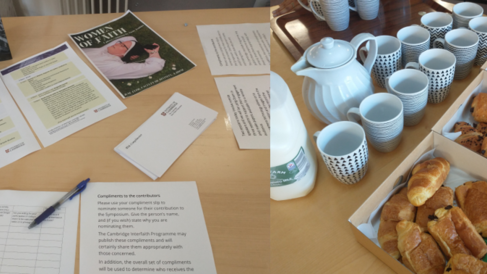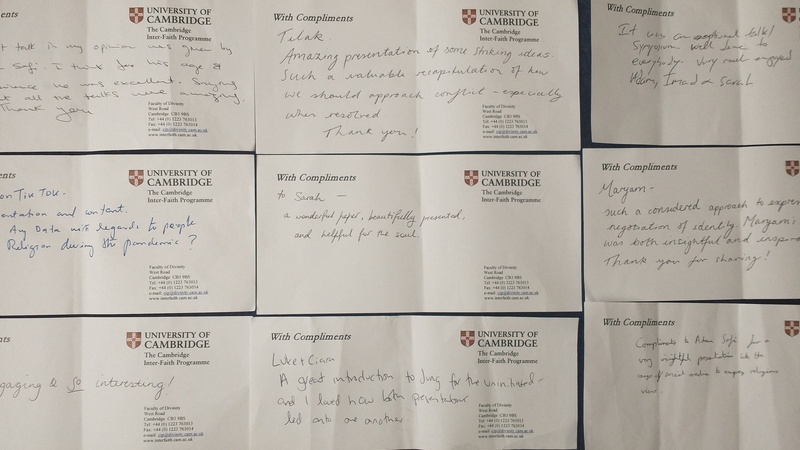
Last Thursday (June 15, 2023), CIP was pleased to host a one-day student symposium on the theme Religion Conflict Dialogue. Devised by three first-year PhD students with the Cambridge Interfaith Programme's support, the schedule was bursting at the seams with fresh research and creativity.
Media and dialogue
The opening session took media as its common thread. Up first was Adam Safi. Under the title “Keyboard Crusades”, Adam analysed parallels between conflict in digital space and physical conflict, arguing that social media is a form of shared proximity.
Sarah Adegbite followed, with a short and dynamic presentation, at the intersection of black liberation theology and literary tradition: “The Caged Bird Sings of Freedom”. Poetic contradiction, as she illustrated compellingly, presents opportunities to do theology outside the parameters of White speech modes.
Completing the Media and Dialogue session was Susie Triffitt. “Born again on TikTok” explored conversion during the COVID-19 pandemic, also the focus of Susie's PhD research.
A midday divide
At midday, participants had options: an information session about Open Access publishing (arranged by the Faculty librarian and colleagues), an extended break, or a gentle yoga-and-meditation session in the Faculty garden. (This year's student body included a qualified yoga instructor.)
The significance of time
Following lunch, the paper-and-presentation format resumed with a pair of papers under the heading “Theology and dialogue through time”. Luke Wilkinson, a postgraduate from the Faculty of History, tackled the opposition between philosophy of religion and intellectual history, arguing that philosophy of history had once kept peace between theology and history. History's recent ‘temporal turn’, Luke suggested, provides an opportunity to reconnect God and time, and so theology and history.
Ciara Clogger-Rodrigues, an MPhil student in Philosophy of Religion, addressed the tension between theological certainties (the perennial truths of a given tradition) and openness to inter-religious dialogue, which seems to require space for negotiation. Susie Triffitt moderated the discussion.
Comparisons
Session three had two overlapping themes: British Muslim experience, and lunar calendars. Maryam Bham, joining remotely, reflected on her experiences as a British Muslim teacher in a Catholic school. While rooted in the specific, the topic enabled Maryam to reflect broadly on pedagogy and professional responsibility, and the different layers of societal expectation British Muslims face in negotiating the work place and matters of personal identity.
Speaking alongside Maryam was Imad Ahmed, a first-year PhD student in Divinity and founder of the New Crescent Society. In “Moon Wars: Calendars and conflict in Islam”, Imad detailed how Muslim ritual life has been impacted by debate—at times descending into physical altercation—about the construction of the lunar calendar, with particular attention to six decades of British Muslim experience.
Alexandra Zhirnova, a CIP affiliate and doctoral researcher in the department of Anglo Saxon, Norse and Celtic, brought in an additional comparative dimension with a short presentation about Easter observation in early medieval Ireland—an earlier case of moon wars. (The alignment was not wholly accidental, since Alexandra was part of the organising team.) This session was chaired by Peach Hoyle.
Geographical examples of conflict and peace-making
The fourth session comprised studies of geographical conflicts. Ria Searle has been completing an MPhil following the Religion and Conflict pathway. Her presentation “Faith in bones” drew on a coursework essay, considering how human remains function as social agents for those remembering the Srebenica genocide, and how faith permeates discourse about locating victims' bones, survivors' hopes, and commemoration.
Tilak Parekh, a second-year PhD student (researching Hindu leadership), presented a case study on the siege of Akshardham Temple, Gujarat, in September 2002. Through ethnography, witness testimony and media reports, Tilak examined how the leadership of Pramukh Swami averted a graver crisis.
This session was also hybrid, enabling Ruki Salgado, a CIP Summer School alumna, to join from Sri Lanka. Highlighting the 2019 Easter Sunday terrorist attacks, Ruki reflected on the intensification of religious tension and the unexpected emergence of unity during the 2022 economic and constitutional crisis. Balancing justice and love of neighbour remains a challenge, but key to long-term societal healing.
Alexandra Zhirnova chaired this final selection of papers (as also the first), rounding off formal proceedings.
Women of Faith in focus
The day’s student contributions drew to an inspiring close with a viewing of a new photographic exhibition: “Women of Faith”. Mounted on the lower ground floor of the Faculty of Divinity, the exhibition featured multiple images of ten women “aged from 1 to 81”.
Photographer and curator Susie Triffitt attributed her inspiration to a trip to Cambridge Central Mosque with PhD student and friend Hina Khalid. The goal was to express and celebrate the diversity of the women photographed, while illustrating the complex intersections of gender, faith, and other identities.
While this was a temporary viewing, further showings are anticipated.
And finally, Religicide
Events closed with the UK launch of Religicide: Confronting the Roots of Anti-Religious Violence (Post Hill Press). This event—featuring the authors Georgette Bennett and Jerry White in conversation with Esra Özyürek—was livestreamed, and is available to watch again on the Faculty of Divinity YouTube channel.
With compliments
At registration, compliment slips were distributed to all attendees, with an invitation to provide feedback on the day's best contribution. These compliments informed the distribution of prizes for the best contributions (to Adam Safi and Imad Ahmed), with all messages shared with the individuals concerned. (A selection of the returned slips are shown in the photograph below.)
Dr Giles Waller, who was present throughout the day to provide a mix of technical support, hospitality, and academic know-how, reflects:
“The organising team did a terrific job. The standard of papers was very impressive, and it was great to see so much diversity in topics, methods and disciplines.
“This is definitely an experience I’d like us to repeat—perhaps with some extra time to really get into the thick of discussions and probe connections between speakers. Well done, everyone!”

